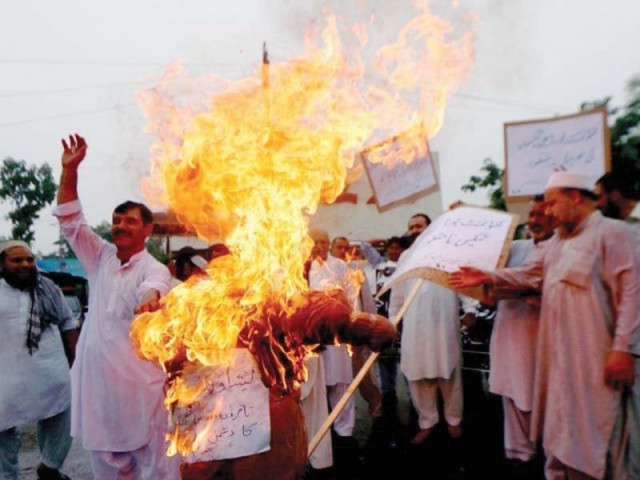Broadening the tax base: Professionals excluded from ‘voluntary tax compliance’
Scheme welcomed, but loopholes to evade taxes exist

Traders vehemently opposed the withholding tax on banking transactions for months, forcing the government to come up with the tax amnesty scheme. PHOTO: FILE
The government has excluded professional services from the ambit of the proposed tax amnesty scheme while leaving a legal lacuna that will surely be exploited to legalise hidden income more than the permissible limit of Rs50 million.
Those considered to be in professional services include chartered accountants, architects, dentists, doctors, engineers, interior decorators and lawyers.
Under the proposed scheme, non-filers and filers of income tax returns have the option to whiten their black money up to the limit of Rs50 million by paying a nominal tax of 1%.
Federal Board of Revenue (FBR) Chairman Nisar Mohammad Khan said the government did not want the option to be perceived as a universal, come-one come-all scheme by including professional services.
He said the FBR would go after those professionals who are earning big, but not paying their due taxes.
Finance Minister Ishaq Dar on Friday tabled the Income Tax (First Amendment) Bill 2016 in the National Assembly to give legal cover to what he called a ‘voluntary tax compliance scheme’. The government may still make amendments in the Bill aimed at covering legal lacunas.
It was the second amnesty scheme in the last many years and the fourth in the last seven years, indicating how frequently governments are using this tool to help evaders whiten their black money.
The PPP government had also introduced two schemes - one income tax amnesty scheme was proposed in 2008 and the second customs duties amnesty scheme in 2013 when it legalised over 53,000 smuggled vehicles.
Expert’s opinion
Chartered accountancy firm, Naveed Zafar Ashfaq Jaffery & Co, has supported the new policy, terming it an “opportunity for filers and non-filer traders to regularise their tax affairs.”
However, the firm has also highlighted some issues, which the government could not grasp while drafting the scheme. It said that individuals and Association of Persons (AOPs) might exploit the scheme by distributing their working capital among several associated persons to whiten their maximum wealth.
For example, an individual having a working capital of Rs500 million may file 10 different returns under names of related persons (sons, daughters, spouse,) and avail the scheme.
Additionally the accountancy firm said that the income tax return filed under the scheme may be amended by the income tax commissioner subject to possession of definite information.
The income disclosed by the trader has also been made subject to amendment instead of limiting the powers to undisclosed wealth.
It said that this provision will render the scheme useless as the powers of commissioner under this clause will be a hanging sword over traders availing the scheme.
In order to secure revenue streams from large-sized traders, the government has also excluded them from the ambit of the scheme.
The retailers who are excluded
According to the proposed Bill, retailers, who are registered under Sales Tax Act, 1990, will be excluded from the definition of traders who are eligible for the scheme.
A retailer operating as a unit of a national or international chain of stores, a retailer who has a credit or debit card machine and a retailer operating in an air-conditioned shopping mall, plaza or centre, excluding kiosks will not be eligible for the scheme.
Further, a retailer whose cumulative electricity bill during the last year exceeds Rs600,000 and a wholesaler-cum-retailer, engaged in bulk import and supply of consumer goods on wholesale basis to the retailers as well as on retail basis to the general body of the consumers will not be entitled to avail the scheme.
Published in The Express Tribune, January 2nd, 2016.
Like Business on Facebook, follow @TribuneBiz on Twitter to stay informed and join in the conversation.


















COMMENTS
Comments are moderated and generally will be posted if they are on-topic and not abusive.
For more information, please see our Comments FAQ